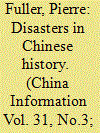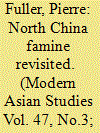| Srl | Item |
| 1 |
ID:
156524


|
|
|
|
|
| Summary/Abstract |
Scholars in various disciplines have recognized that ‘natural’ disasters – and the extent to which natural hazards develop into humanitarian catastrophe – can reveal fundamental aspects of any particular government or society. What does history offer observers of disasters in contemporary China? What was the Chinese experience of environmental or natural disasters in pre-revolutionary or even premodern times? As recently as the early 2000s, the field of Chinese history offered little to answer such questions. Meanwhile, web searches remain the predominant avenue for non-academic researchers seeking historical contextualization, yet online searches on the vast majority of disasters in Chinese history continue to produce negligible results. With this in mind, a group of historians launched the website DisasterHistory.org in autumn 2015. Emerging now from its pilot stages, the site’s goals are to serve as an online introductory portal for academic studies and sources on Chinese disasters, to provide an accessible and reliable ‘go-to’ resource for academic researchers generally, and to create a forum for data-sharing and collaborative research for scholars across disciplines with shared interests in disasters, broadly defined.
|
|
|
|
|
|
|
|
|
|
|
|
|
|
|
|
| 2 |
ID:
121956


|
|
|
|
|
| Publication |
2013.
|
| Summary/Abstract |
This paper makes the case that in China's most severe food crisis of the first quarter of the twentieth century-the great north China famine of 1920-1921-considerable life-saving relief was generated by three largely-neglected segments of Chinese society: Buddhist and other native charity efforts working along parallel social channels to the better-publicized missionary and international relief groups; the Republic's much-maligned military establishment; and officials and residents of the stricken communities themselves who were operating largely 'below the radar' of the distant, mostly city-based chroniclers of the famine whose voices have been privileged in the later history-writing process. Despite the recent fall of the Qing and the beginnings of a fractured era of warring between provincial governors, this paper suggests that communities in the increasingly neglected periphery of 1920 north China were significantly more viable and attentive to social welfare needs than has been previously recognized.
|
|
|
|
|
|
|
|
|
|
|
|
|
|
|
|